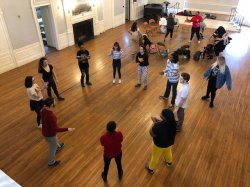New BA Theatre Studies Course Helps Students Lose the Stage—and Gain New Perspective
The new course aims to provide unique performance insights
Posted in: Announcements

A play by a world-renowned playwright set in 1935 in which a group of women explore their lives and relationships through the lens of womanhood.
A local building which for 90 years has served as a hub for women “to develop individual efficiency, stimulate interest in current affairs, and encourage cooperation in all lines of progress.”
How does one illuminate the other?
That’s just what BA Theatre Studies students are exploring in the new class: Site Specific Performance, led by Professor Jessica Brater.
“In this course, students create performances outside of traditional theater spaces through the integration of interdisciplinary research and theatrical practice. Our BA program places emphasis on the relationship between what happens on stage and what happens in the world around us, and Site-Specific Performance allows us to do that in a unique way—through the lens of space,” explains Brater.
This spring, the class partnered with the Montclair Women’s Club, which for the past 90 years has made its home at 82 Union Street in Montclair. To stage, Brater selected the feminist play FEFU AND HER FRIENDS: an experimental drama by pioneering Cuban-American playwright Maria Irene Fornes which follows a close-knit band of 1930s women (well-bred and well-heeled but hardly well-behaved) as they spend an eventful day at Fefu’s country house. The students then explored how staging the play within the Montclair clubhouse building, with its rich and storied past, lineage of female leadership and collaboration, and variety of internal spaces, would shape how and where the story would come to life. Student Carol Rotella reflects on the experience this way: “I think doing a piece like this in a location that grounds you in the world of the play brings out nuances that wouldn’t exist in a traditional theater setting. It adds another connective element to the work and makes the project all around more meaningful.”
Questions such as where to stage each scene, and how the audience would be moved between the spaces were foundational. But they didn’t stop with the physical relationship to the space: students also engaged questions of how its stories might intertwine and reverberate with each other.
“We had two fruitful days of archival research at the Montclair Women’s Club and at the nearby Montclair History Center; since the history of women at the MWC is about white women, we went just around the corner to the History Center, which has a good archive of material on African-American history in Montclair. The most rewarding moment for me was when a student in the class (Charles Cobbertt) exclaimed, “Time flies when you are doing archival research!” One of the most exciting aspects of this class is getting the students off-campus and into the townships around us through the partnerships we create. That’s what allowed them to make these embodied connections between archival research and theatrical production.”
This collaboration is the latest in a growing body of work that connects BA Theatre Studies students to the stories of local communities, following on last spring’s original piece “The Orange Project: Lights Up on Education” created by the Theatre for Community Impact class in collaboration with educators, community leaders, students, and teachers in Orange on the eve of the town’s first election of a Board of Education. Both classes reinforce the goal of the BA Theatre Studies major to create “artists as citizens,” and the mission of the University “to play a role beyond the campus community, partnering and collaborating at the local, state, national and international levels to make positive contributions to addressing issues of importance to society, to enable students to experience their ability to use knowledge in constructive ways in the world, and to share the rich array of intellectual and cultural resources of the University with the people of New Jersey.”
As in any good partnership, the benefits are mutual: “In sharing our club’s history with the students, this project became an exciting opportunity for us as well,” said Montclair Women’s Club archivist Liz Lynch. “Their enthusiasm and fresh perspectives were fascinating, and we’re excited to see the result of all their hard work.”
And the effect of this partnership on the students? Says Rotella: “This class has reaffirmed for me the idea that it’s important to work collaboratively and create your own work. Theatre doesn’t have to always be made in the theater. I feel more confident as an actor on my personal ability to adapt a text, as well as the importance of research. Site Specific gives you the ability to think outside the box from the traditional theatrical lens.”
Fefu And Her Friends, as adapted and performed by the BA Theatre Studies Site Specific Performance class, will be performed at 3 p.m. Sunday, April 28 and 7:30 p.m. Tuesday, April 30 at the Montclair Women’s Club, 82 Union Street, Montclair. There is a suggested donation of $10 to support the Montclair Women’s Club.
